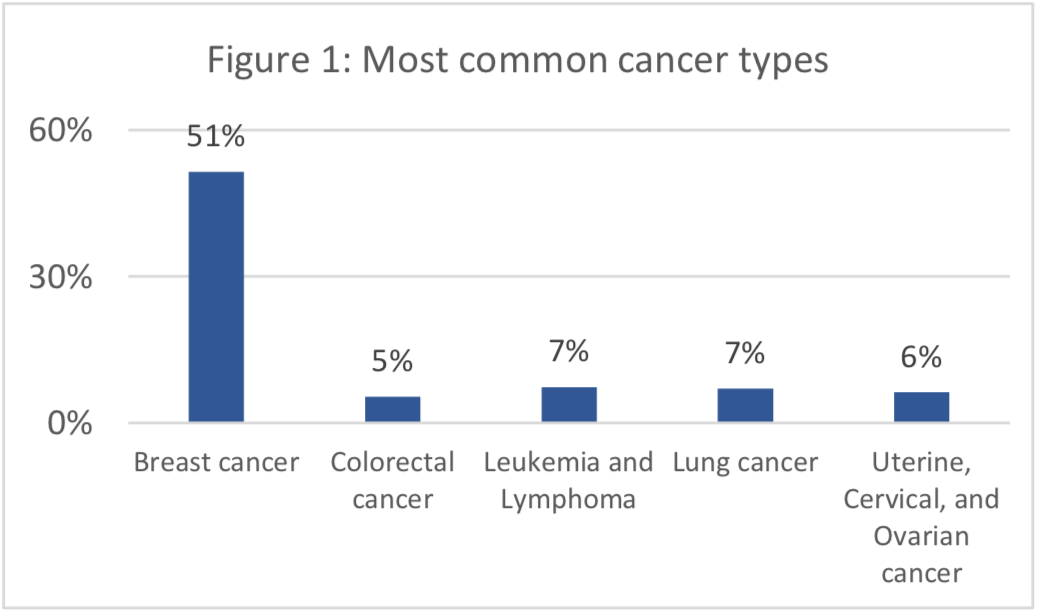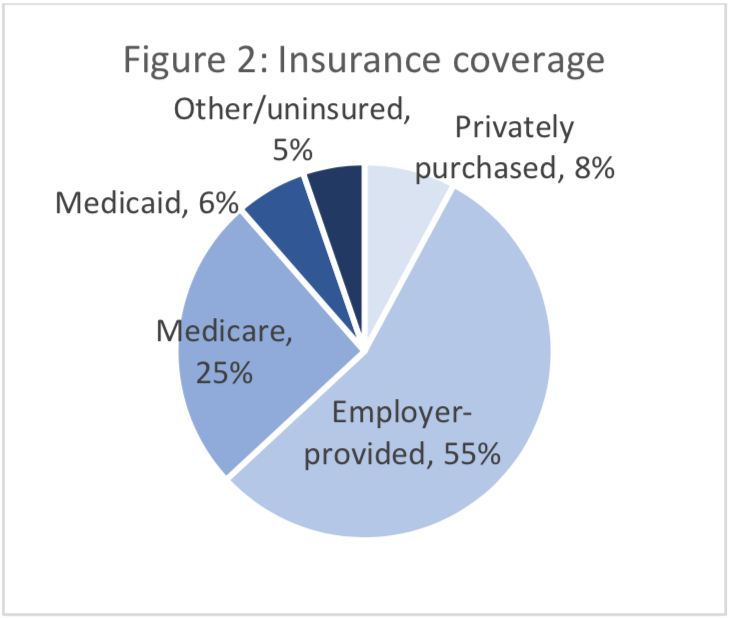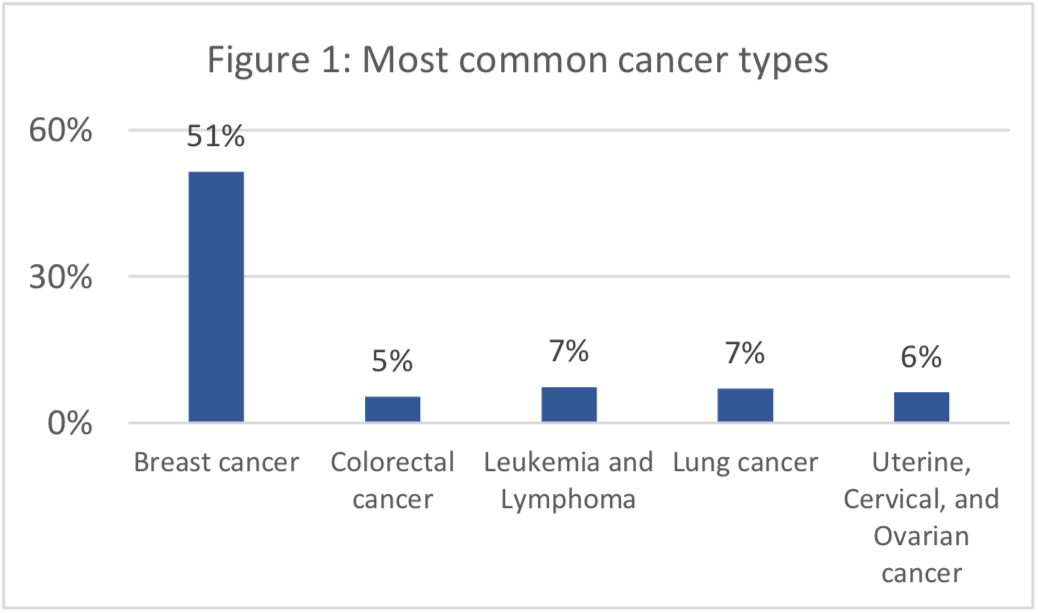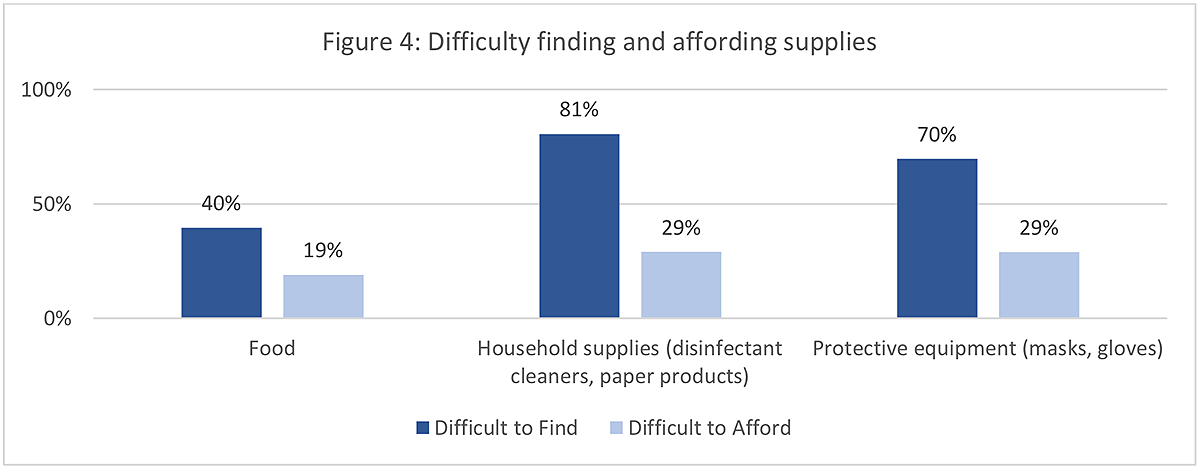Overview:
The COVID-19 pandemic and responses to help prevent its spread have had far-reaching impact on the cancer community. The American Cancer Society Cancer Action Network (ACS CAN) deployed a survey in late March that found many challenges to cancer patients and survivors, including delays and cancellations of health care services, economic challenges affecting their ability to pay for care, and concerns about their future ability to access and afford the care they need.
As part of our ongoing efforts to monitor and more clearly understand the impact of the COVID-19 pandemic on the vulnerable population of US cancer patients and survivors, ACS CAN initiated an additional survey effort on April 30, 2020. The survey was deployed across a two-week period to a broad cross section of cancer patients and survivors through direct email outreach, social media promotion, and coordination with partner organizations who serve the cancer community. In addition, we reached out to a small sample of caregivers and health care providers working with cancer patients and survivors to understand how the pandemic is affecting them as members of the cancer community and the subsequent impact on the patient and survivor population.
The survey focused on respondents’ experiences accessing and affording health care, obtaining food and necessary household/medical supplies, and maintaining their physical, emotional, and mental health during the COVID-19 pandemic. The web-based survey was taken by more than 1,200 cancer patients and survivors. This sample provides a margin of error +/- 3% and 96% confidence level. Additional input was provided by 111 caregivers and 139 health care providers supporting cancer patients and survivors.
The research provides important insights into the experiences of cancer patients and survivors in safely navigating the challenges of the COVID-19 pandemic.
Key Findings:
Key findings from the survey include:
- The difficulties cancer patients and survivors encounter accessing and affording health care have increased as the COVID-19 crisis continues. Most alarmingly, 79% of patients in active treatment for their cancer reported a delay to their health care (up from 27% in a previous survey), including 17% of patients in active treatment who reported delays to their cancer therapy (such as chemotherapy, radiation, or hormone therapy). Delays were also common among patients who are not currently in active treatment, 78% of whom reported their health care (including care related to their cancer as well as regular/preventive care and care for other ongoing health issues) had been delayed. One-fifth of all cancer patients and survivors surveyed reported concern that their cancer could be growing or returning due to their challenges in obtaining health care, a worry that was reinforced by the providers we heard from.
- Nearly half (46%) of cancer patients and survivors reported a change to their financial situation that affected their ability to pay for care, an increase from 38% in the survey released in April. Notably, 23% are worried about losing health insurance, and 27% of those who are on employer-sponsored plans express this concern. Beyond paying for health care, nearly a third (32%) of cancer patients and survivors are worried about their ability to afford basic household
expenses, such as rent/mortgage, utilities, and food, a concern that is highly correlated with income.
-
Nearly half of respondents (48%) reported that their experience as a cancer survivor during the COVID-19 pandemic is affecting their mental and/or emotional well-being. The relaxation of social distancing measures in many areas creates additional stress and anxiety, with two-thirds (67%) of cancer patients and survivors expressing concern about their ability to safeguard their health as shelter in place orders are lifted. Protective supplies such as masks and gloves may help alleviate this concern, but 70% of respondents report difficulty finding such equipment.
Detailed Survey Findings
 The survey included a wide range of US cancer patients and survivors. Fifty-four percent of respondents are currently being treated for cancer; among respondents who are not currently in active treatment, one-third (33%) received their last treatment within the last three years. Half (52%) of respondents are breast cancer survivors, with broad representation across additional cancer types.
The survey included a wide range of US cancer patients and survivors. Fifty-four percent of respondents are currently being treated for cancer; among respondents who are not currently in active treatment, one-third (33%) received their last treatment within the last three years. Half (52%) of respondents are breast cancer survivors, with broad representation across additional cancer types.
Over half of respondents (55%) receive insurance coverage through an employer, and 25% are covered by Medicare. Eight percent have privately purchased health care, such as through an exchange, and six percent are covered by Medicaid. Compared to insurance coverage for the US general population, the survey included more respondents on Medicare and fewer on privately purchased plans or Medicaid1, which is likely a result of increased cancer incidence rates among older Americans.
 Eighty-seven percent of respondents report some change, delay or disruption to their health care as a result of the COVID-19 pandemic, including regular and preventive health care (80%), care related to their cancer (62%) and health care to treat other chronic or ongoing conditions (68%). This represents a dramatic increase in cancer survivors reporting impact from our previous survey released in April, in which 51% of cancer patients and survivors reported that their health care had been affected by the pandemic.
Eighty-seven percent of respondents report some change, delay or disruption to their health care as a result of the COVID-19 pandemic, including regular and preventive health care (80%), care related to their cancer (62%) and health care to treat other chronic or ongoing conditions (68%). This represents a dramatic increase in cancer survivors reporting impact from our previous survey released in April, in which 51% of cancer patients and survivors reported that their health care had been affected by the pandemic.
The most commonly reported impact is a delay in care, with 78% of respondents reporting a delay to obtaining health care, up from 24% in the previous survey. Four out of five respondents reported a change, disruption, or delay to their preventive care; nearly half (49%) have delayed a regular checkup or physical, a quarter have delayed a routine screening exam, and 17% did not see a doctor for an illness or injury they would have otherwise. Among those who delayed or cancelled care, the majority (59%) said the decision was made by their provider. Checkups and screenings are an important part of cancer survivor follow-up care and delaying or missing these could delay the detection of a recurrence of their cancer.
Thirty-seven percent of cancer patients and survivors reported that health care related to their cancer has been delayed by the COVID-19 crisis, a number that rises to 44% for those who are currently in active treatment. Concerningly, these delays are most often longer in term, with 22% of all respondents (27% of respondents in active treatment) reporting delays of more than two weeks to their cancer care and 18% (19% in active treatment) indicating their cancer care has been delayed and they do not know when it will be rescheduled. Cancer care includes a range of services, including consultation with providers to plan and administer care for their cancer, anti-cancer therapies and surgery, imaging to determine if their cancer has grown or returned, and other health care directly related to their cancer.

The most commonly impacted cancer care service continues to be in-person provider visits (57% of impacted respondents), followed by imaging to monitor their cancer growth (25%). Imaging services were also more likely to be delayed without visibility into when they would be rescheduled. Seventeen percent of patients in active treatment report that their anti-cancer therapy (such as chemotherapy, radiation, or hormone therapy) has been impacted by the COVID-19 pandemic, up from eight percent in the previous survey. Fifteen percent of cancer patients and survivors reported that inpatient surgical procedures had been affected by the COVID-19 crisis.
Thirty-seven percent of cancer patients and survivors reported that health care related to their cancer has been delayed by the COVID-19 crisis, a number that rises to 44% for those who are currently in active treatment. Concerningly, these delays are most often longer in term, with 22% of all respondents (27% of respondents in active treatment) reporting delays of more than two weeks to their cancer care and 18% (19% in active treatment) indicating their cancer care has been delayed and they do not know when it will be rescheduled. Cancer care includes a range of services, including consultation with providers to plan and administer care for their cancer, anti-cancer therapies and surgery, imaging to determine if their cancer has grown or returned, and other health care directly related to their cancer.
The most commonly impacted cancer care service continues to be in-person provider visits (57% of impacted respondents), followed by imaging to monitor their cancer growth (25%). Imaging services were also more likely to be delayed without visibility into when they would be rescheduled. Seventeen percent of patients in active treatment report that their anti-cancer therapy (such as chemotherapy, radiation, or hormone therapy) has been impacted by the COVID-19 pandemic, up from eight percent in the previous survey. Fifteen percent of cancer patients and survivors reported that inpatient surgical procedures had been affected by the COVID-19 crisis.
As with preventive care, most cancer patients and survivors report that their health care provider initiated the changes to their cancer care (64%). The most common reasons for providers to suggest these changes were to safeguard the patient from risk of infection (46%) and facility closures (30%). Where patients suggested changes to care, they most often did so because of anxiety about exposure to COVID-19 (55%) and lack of certainty about whether they should go out in public to obtain care (18%).
Disruptions and delays in accessing health care have potential long-term impact on cancer patients’ health and the management of their disease. One-fifth of cancer patients and survivors reported concern that their cancer could be growing or returning due to their challenges in obtaining health care. Health care providers reinforced their concern, expressing worry that care delays and disruptions may lead to later stage cancers in their patients.
The impact of the COVID-19 pandemic on the health of cancer patients and survivors extends beyond their ability to obtain health care services. Nearly a quarter (24%) of respondents report that the outbreak has made it more difficult to contact their providers with questions about their needs as a cancer survivor. Nearly half of respondents (48%) reported that their experience as a cancer survivor during the COVID-19 pandemic is affecting their mental and/or emotional well-being.
In response to the pandemic, a majority of respondents (70%) are sheltering in place with trips out only as needed and eight percent are not leaving their homes at all. However, the logistics of obtaining supplies needed to shelter in place has proven challenging for many, with 40% reporting difficulty finding food (including a variety of healthy foods) and nearly one in five (19%) saying it was difficult to afford food. Many still need to leave home for work as well, with 18% of cancer survivors indicating they are still working outside the home, including 11% of respondents in active treatment.
As many states and localities are beginning to relax social distancing measures, the physical and mental stress on cancer patients and survivors increases, with two-thirds (67%) of respondents agreeing that they are worried about their ability to stay safe as social distancing measures relax. This is of particular concern for minority respondents, over three quarters (76%) of whom expressed concerns about relaxing social distancing compared to 65% of white respondents (a difference that is statistically significant at the <.003 level). This concern was also echoed by caregivers, as they face the prospect of helping safeguard the health and well-being of someone with cancer as shelter in place orders are removed.
In order to safely resume normal activities, it’s important that cancer patients and survivors are able to access the supplies and equipment needed to stay safe. However, 70% of respondents told us they had difficulty finding protective equipment, such as masks and gloves, and 29% reported difficulty affording this equipment. This difficulty was similarly reported by the providers we heard from, most of whom are unable to follow recommended guidelines due to shortages of personal protective equipment. As a result, most providers reported the need to re-use equipment during a shift or across multiple patients.

Nearly half (46%) of cancer patients and survivors reported a change to their financial situation that affected their ability to pay for care, an increase from 38% in the survey released in April. Respondents continued to express concern that the financial impact of the COVID-19 pandemic will make it hard to afford the care they need as cancer survivors (30%, compared to 28% in April). Notably, 23% are worried about losing health insurance, and 27% of those who are on employer-sponsored plans express this concern.
Beyond paying for health care, nearly a third (32%) of cancer patients and survivors are worried about their ability to afford basic household expenses, such as rent/mortgage, utilities, and food. This concern is highly correlated with household income, with over half (54%) of respondents with income under $30,000 expressing this concern (p<.001).
Methodology
ACS CAN’s COVID-19 survey was administered online from April 30 through May 14, 2020. Cancer patients and survivors were invited to participate via direct email to American Cancer Society contacts, promotion through ACS and ACS CAN social media accounts, Facebook advertisements to individuals without a current relationship to ACS or ACS CAN, and outreach via partner organizations whose constituents include cancer patients and survivors. In addition to cancer patients and survivors, the survey gathered input from caregivers and health care providers working with the cancer community to provide a more robust understanding of the issues.
To ensure the protection of all participants in this survey, all research protocols, questionnaires, and communications were reviewed by the Morehouse School of Medicine Institutional Review Board.
A total of 1,228 participants responded to the survey, providing a margin of error +/- 3% and 96% confidence level. Additional input was provided by 111 caregivers and 139 health care providers supporting cancer patients and survivors.
We would like to thank the partner organizations who helped share the survey and promote a broad response, including the American Society or Clinical Oncologists (ASCO), Cancer Survivors Network (CSN), Academy of Oncology Nurse and Patient Navigators (AONN), Cancer Support Community (CSC), LUNGevity, Braintumor.org, Association of Community Cancer Centers (ACCC), Pancreatic Cancer Action Network (PanCAN), and Leukemia & Lymphoma Society (LLS).
1 For 2018 US insurance coverage sources, please see: https://www.kff.org/other/state-indicator/total-population/
 The survey included a wide range of US cancer patients and survivors. Fifty-four percent of respondents are currently being treated for cancer; among respondents who are not currently in active treatment, one-third (33%) received their last treatment within the last three years. Half (52%) of respondents are breast cancer survivors, with broad representation across additional cancer types.
The survey included a wide range of US cancer patients and survivors. Fifty-four percent of respondents are currently being treated for cancer; among respondents who are not currently in active treatment, one-third (33%) received their last treatment within the last three years. Half (52%) of respondents are breast cancer survivors, with broad representation across additional cancer types. Eighty-seven percent of respondents report some change, delay or disruption to their health care as a result of the COVID-19 pandemic, including regular and preventive health care (80%), care related to their cancer (62%) and health care to treat other chronic or ongoing conditions (68%). This represents a dramatic increase in cancer survivors reporting impact from our previous survey released in April, in which 51% of cancer patients and survivors reported that their health care had been affected by the pandemic.
Eighty-seven percent of respondents report some change, delay or disruption to their health care as a result of the COVID-19 pandemic, including regular and preventive health care (80%), care related to their cancer (62%) and health care to treat other chronic or ongoing conditions (68%). This represents a dramatic increase in cancer survivors reporting impact from our previous survey released in April, in which 51% of cancer patients and survivors reported that their health care had been affected by the pandemic.

